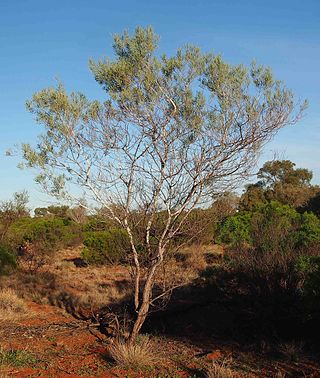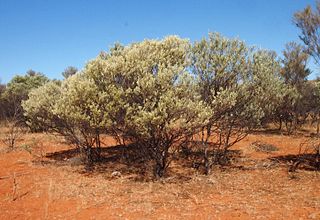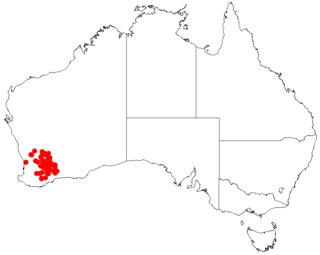
Acacia cultriformis, known as the knife-leaf wattle, dogtooth wattle, half-moon wattle or golden-glow wattle, is a perennial tree or shrub of the genus Acacia native to Australia. It is widely cultivated, and has been found to have naturalised in Asia, Africa, North America, New Zealand and South America. A. cultriformis grows to a height of about 4 m (13 ft) and has triangle-shaped phyllodes. The yellow flowers appear from August to November in its natural range. Its attractive foliage and bright flowers make it a popular garden plant.

Acacia murrayana is a tree in the family Fabaceae. It has numerous common names, including sandplain wattle, Murray's wattle, fire wattle, colony wattle and powder bark wattle, and is endemic to arid areas in every mainland state except Victoria.

Acacia complanata, known as long-pod wattle and flat-stemmed wattle, is a perennial tree native to eastern Australia.

Acacia cuthbertsonii is a perennial shrub or tree native to arid parts of inland and northwestern Australia.

Acacia longifolia is a species of Acacia native to southeastern Australia, from the extreme southeast of Queensland, eastern New South Wales, eastern and southern Victoria, southeastern South Australia, and Tasmania. Common names for it include long-leaved wattle, acacia trinervis, aroma doble, golden wattle, coast wattle, sallow wattle and Sydney golden wattle. It is not listed as being a threatened species, and is considered invasive in Portugal, New Zealand and South Africa. In the southern region of Western Australia, it has become naturalised and has been classed as a weed due to its out-competing indigenous species. It is a tree that grows very quickly, reaching 7–10 m in five to six years.

Acacia verticillata is a perennial shrub to small tree native to south eastern Australia.

Acacia myrtifolia, known colloquially as myrtle wattle, red stem wattle or red-stemmed wattle, is a species of Acacia native to coastal areas of southern and eastern Australia.

Acacia pravissima, commonly known as Ovens wattle, Oven wattle, wedge-leaved wattle and Tumut wattle, is a species of flowering plant in the legume family, Fabaceae. It is an evergreen shrub native to southeastern Australia.

Acacia triptera, commonly known as spurwing wattle, is an erect or spreading shrub which is endemic to Australia.

Acacia cognata, commonly known as bower wattle, river wattle or narrow-leaved bower wattle, is a tree or shrub species that is endemic to south eastern Australia.

Acacia linifolia, known colloquially as white wattle, or flax wattle, is a species of Acacia native to eastern Australia.

Acacia acutata is a species of flowering plant in the family Fabaceae and is endemic to the south-west of Western Australia. It is an inticately branched, often compact shrub with spiny branchlets, sharply pointed, triangular to trowel-shaped phyllodes, flowers arranged in spherical heads of 11 to 15 flowers, and firmly papery pods, rounded over the seeds.

Acacia alexandri is a species of flowering plant in the family Fabaceae and is endemic to the Cape Range in the north-west of Western Australia. It is a glabrous shrub with slender branchlets, linear phyllodes, and cream-coloured flowers arranged in 1 or 2 spherical heads in the axils of phyllodes, and narrowly oblong, papery pods up to 70 mm (2.8 in) long.

Acacia georgensis, commonly known as Bega wattle or Dr George Mountain wattle, is a species of Acacia native to southeastern Australia. It was one of eleven species selected for the Save a Species Walk campaign in April 2016 when scientists walked 300 km to raise money for collection of seeds to be prepared and stored at the Australian PlantBank at the Australian Botanic Garden Mount Annan.
Acacia infecunda, also known as famine wattle, is a shrub belonging to the genus Acacia and the subgenus Phyllodineae that is native to parts of south eastern Australia.

Acacia juncifolia, commonly known as rush-leaf wattle, is a shrub or tree belonging to the genus Acacia and the subgenus Phyllodineae that is endemic to north eastern Australia.

Acacia obtusata, commonly known as blunt-leaf wattle or obtuse wattle, is a tree or shrub belonging to the genus Acacia and the subgenus Phyllodineae native to eastern Australia.
Acacia nanopravissima, also known as little kooka wattle, is a shrub belonging to the genus Acacia and the subgenus Phyllodineae where it is endemic to south eastern Australia.

Acacia kettlewelliae, commonly known as buffalo wattle, is a tree or shrub of the genus Acacia and the subgenus Phyllodineae that is endemic to south eastern Australia.

Acacia desmondii, also known as Des Nelson wattle is a shrub belonging to the genus Acacia and the subgenus Juliflorae that is native to central Australia. It is listed a vulnerable.

















